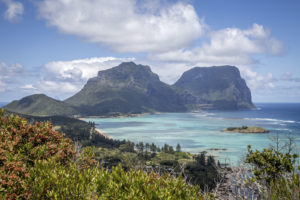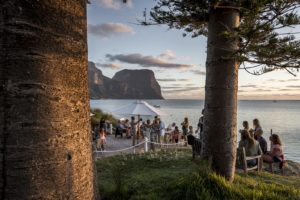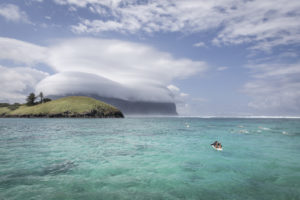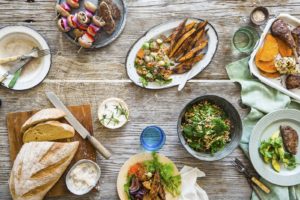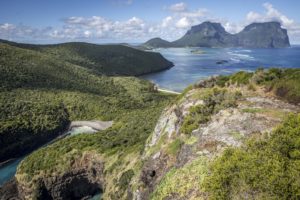Dennis Tierney is the newest addition to the Pinetrees kitchen, and if the start of this season is anything to go by, we’re in for some big things.
If you’ve stayed with us in the past few months, you’ll most likely be able to recognise the man by his desserts. Dennis has a penchant for theatrics. If molten chocolate sauce has been generously poured on your dessert at the table, or your coconut broth has begun to fizz and crackle before your eyes, you’ve had an encounter with Dennis.
Born in rural NSW, Dennis’ introduction to the world and its food came at the age of 4, when his parents decided to sell his family home and travel throughout Asia and Europe. This early adventure set him up for a lifetime of more adventure, and gave him a taste for spice, flavour, and the finer things that European and Asian cuisine have to offer.
Dennis remembers making the decision to leave school and pursue cooking after reaching the national finals in a school-based cooking competition. After placing first in his region and then first in NSW, the country boy from Grafton recalls painting his farm boots black and borrowing a too-small uniform to compete in the national titles. Dennis finished up fourth in the competition, and on the way home, his mum told him he could leave school as long as he could find a job.
One short week later, Dennis started his apprenticeship at two-hatted restaurant, Fins, in Byron Bay. Dennis forged his skills with some of Australia’s best chefs including Matt Upson, Neil Perry, Tetsuya Wakadu and Pinetrees’ Food and Wine Week extraordinaire Steven Snow.
Dennis describes his 3 great passions as travel, cooking and photography. Fortunately for us, he combines aspects of all these passions when he works. On any given night you’ll have a menu boasting mouth-watering Asian-fusion dishes, conceived of and cooked by Dennis and the team, with a full-fledged photo shoot happening throughout the middle of service. The results are great food, great photos, satisfied diners and the occasional flash-blinded waiter.
When Dennis isn’t in the kitchen you’ll find him casually going for an 8km kayak around the Admiralty Islands, or perhaps foraging around the island for some mushrooms, salt bush or something exotic yet local to finish off your nightly meal.
It’s Dennis’s last 9 years on Lord Howe that have given him his alias of ‘The Stranded Chef.’ Dennis is an active food writer and blogger, keeping his online following both updated and envious with his recipes and adventures here on the island. ‘The Stranded Chef’ provides a unique insight into working with some of the freshest and highest quality ingredients that can be found here on Lord Howe, contrasted with some of the challenges that our geographic location can present.
Dennis’s story is fascinating – let him tell you more in his own words….
Where are you from? A little town in the Byron Bay Hinterlands, The Channon. I grew up on a semi self-sufficient farm in a family of six. Our land was bordered by World Heritage national park, winding creeks, my father’s bushfood forests and dense subtropical rainforest. A child’s perfect playground.
Where did you go to high school? I’d travel with my siblings and other bush kids over an hour on a dirt road, marked with pot holes and one lane bridges, to reach the local high school, Richmond River High in Lismore, NSW. It was an eclectic group of teenagers originating from farms, communes, bush and town. It had a strong academic focus, but had alternative courses in the arts and trades.
What did you do for fun as a teenager? Hmm… not sure if I’m allowed to spell it out. But I used to go to a lot of parties – sometimes trekking miles into the middle of nowhere to arrive at a lit-up bush doof or full moon beach party. Like all moody teenagers, I liked to spend hours listening to overly loud music and wasting my time dreaming of getting out. I was lucky enough that my parents supported my artistic nature and encouraged my interests in travel and food. I worked in my parent’s restaurants, and travelled with them – often with my old Pentax camera around my neck and my nose in some food.
What did you study? I did my cooking apprenticeship in Wollongbar TAFE, while working for Stephen Snow’s two chef hat restaurant, Fins, in Bryon Bay.
What did you do in your spare time? I can’t say I had much spare time – I worked a lot. I guess I used to go out and sample the night life that Byron Bay offered. That meant, live music, nightclubs, dancing and booze. I also spent what little daylight hours I had free on the beach, swimming and sleeping… lots of sleeping.
List the countries you’ve travelled to? I have been to too many to remember. That sounds a bit short, but it’s true. I’ve been travelling since I was five. At a guess, I’ve been to around 30 countries; most of Asia, most of Europe, a large chunk of north Africa and other places dotted around the globe.
Which countries have you lived in for longer than 6 months? I travelled the Mediterranean working on a super yacht for 6 months every year for 3 years. It wasn’t one country but several. Other than that, I have only ever lived in Australia.
What languages do you speak? Not the best English
Tell a story about an unforgettable travel adventure you’ve had: I’ve had so many – I’m even writing a book at the moment. I have hundreds of unforgettable moments gathered during backpacking through Asia – chewing betel nut and drinking whisky with locals in Myanmar, climbing around the peaks of Mount Everest, trekking the Pyrenees in France, sailing the Mediterranean and eating my way around Europe. I guess some of the most unforgettable experiences can often be the ones that you wish you could forget. A few years back, I thought I was going to die. Myanmar had opened its borders to tourism and I decided to backpack my way through it. However, my holiday did not go as planned and I spent a good chunk of my short time there in a hospital. It happened really quickly. One day I was healthy, happy and exploring, while the next day I was in a primitive hospital with dirt floors. The raging fever that comes with a tropical disease had me questioning what was real and what was hallucination? I do remember watching the hospital staff remove a needle from another patient’s catheter and then inserted into to mine. They also ‘washed’ me by rolling me up in my bed sheets and carrying me outside, and then hosing me down with the cold hard water from a fire hydrant. All the time I was sure that if I didn’t die from the illness I was surely going to die from the hospital.
This was a soul searching time where I made many promises to myself and to every god I could think of. If I got out of this alive I was going to make some changes. Eventually, I was deemed well enough to be discharged to a guest house where I then spent time recuperating amongst the temples and pagodas of the World Heritage listed Bagan region. One morning, after reflecting on my life, and the close call of death, within a beautiful isolated pagoda, I decided that I needed a permanent reminder of this time, and the promises I had made. Upon leaving, there was a bent over, but smiling old man selling his artwork. One in particular caught my eye – an elephant that showed so much strength in its proud form, but delicacy in its intricate detail. Immediately I knew that this was it. When I returned to Thailand, I took this painting to a tattooist and had it drawn across my back – forever making this an unforgettable experience.
Tell a story about a funny situation you’ve had while travelling: Trekking for months across the Pyrenees on a pilgrimage of sorts with my brother is a trip that changed my life. I have hundreds of stories from this trip – some funny, heart-warming, scary and soul searching. One such story is about horses and goats. After days of trekking without seeing anyone, through a breathtaking wilderness, we were about to walk through a valley that was known for its wild black horses – the Chevel de Mérens. They are rare to see, but suddenly we saw some not too far away. Before I knew it, they were walking very quickly towards me. With nowhere to go, I started to run towards a small boulder, the only thing nearby. I quickly jumped on top of it just before I was engulfed by a herd of these rarely seen horses. Then I was standing on a boulder, no more than 1.5 m tall, with horses at my feet licking the rock as if trying to lick me. I could hear my brother laughing a loud belly laugh. I must have looked a sight. After a little while the herd dispersed and lost interest in us and we continued our journey.
After 2 hours we reached the end of the day’s journey, a tall mountain peak. Exhausted in sweat stiffened clothes we rested in a grass clearing. Again, before we knew it we were surrounded by another herd. This time it was a heard of bearded goats. They came upon us so quickly we had no time to get out of their way. This time, the licked us. All our skin and clothes. At first we were worried… then we began to laugh…. and laugh. This was the most unusual shower we had ever had! I’m pretty sure the animals in that region have some sort of salt deficiency – it was the salt of the rock on the boulder and the salt on our skin that was drawing the herds towards us.
What other jobs have you had? As a chef, I have worked in fine dining restaurants, including the two-hat Fins in Byron Bay, and Sydney’s two-hat Aria, Bel Mondo and the former three-hat Bilsons. I’ve learnt from talented chefs such as Steven Snow, Tony Bilson, Seiji Yamamoto, Manu Feildel, Matt Moran and Masaki Saito.
I started my career on the Lord Howe Island as Sous Chef at Capella Lodge, ten years ago. I was Head Chef at Lord Howe Island’s five-star Arajilla Resort for five years before commencing my current position at Pinetrees. I have also spent time working as a chef on superyachts on the Mediterranean.
I have kept current with modern culinary trends and techniques through staging in restaurants such as Peter Gilmore’s Bennelong and Quay restaurant in Sydney and Asia’s best restaurant, Gaggan, in Bangkok.
What got you interested in hospitality? Ever since I was young, I have memories of mum in the kitchen. She wasn’t the traditional stay at home mum, but a chef. She came to Australia in her 20s, and traveling through Europe, the Middle East and Southeast Asia along the way, picking up many flavours and adventures. Growing up, those flavours were part of our everyday life. I loved watching her cook – in the kitchen at home and at the tea house that my family owned and ran. As I grew up, I was inspired by how my mother cooked amazing food from nothing, experimented with different flavours and catered for events.
What’s your perfect job? The one I’m in now- of course, which allows me to experiment with food, have amazing fresh ingredients at my fingertips, time to travel and live a great lifestyle in my time off.
How do you spend your spare time? I love travelling, and when tourist season has finished I often find myself travelling somewhere. However, Lord Howe is my home and I love living here. On my days off, or even between shifts or after shifts, I will go for a quick dip in the crystal clear water, a snorkel, a fish off the jetty, a walk through the rainforest, a trek up a mountain or a free dive for crays off the reef. I love preparing food for friends, and trying different produce grown or foraged on the island. However, my all-time favourite thing to do is drifting in my little boat, with a couple of drinks, a couple of mates, and some good banter.
Tell me three things that other people find interesting about you?
I tell a good story, I’m out for a good time and I’m generous…. so I’ve been told?
What have you done (even something really small…..) for humanity? Fed them- my parents have always done things for the community and tried to help those less fortunate. They are an inspiration. When I was at school a group of local kids went on a trip to Thailand. We worked to save our money for the trip in the local café. We managed to save some extra money so that we could contribute to a charity over there. We were told about a little school located in a hill tribe in the north of Thailand, just shy of the Myanmar border. This was a school full of displaced children. They were pushed over the Myanmar border by a family that wanted a better life for them, but were not accepted by Thai government as being citizens and didn’t provide for them. As school kids we travelled to this village and brought bikes, rice, washing powder, and teaching aides to help. This was a really big learning curve for us all. The thing is – I don’t know if we really did make much of a difference. That’s the problem. Who gets the most benefit out of ‘helping’ humanity? The helper often leaves feeling good about themselves, and the ‘helped’ still needs a lot more. But I truly believe there are people out there doing so much for humanity – they are the ones that don’t boast about it.
Meet our Staff – Carol Deacon


